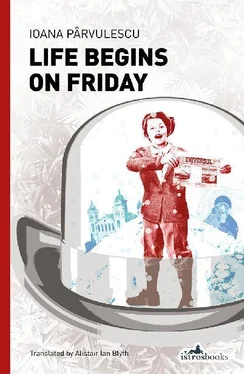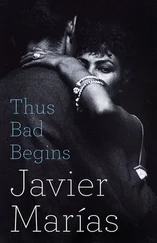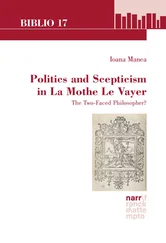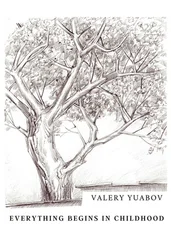‘I did not know that you needed praise,’ I ventured to murmur, my eyes still fixed on the mud stain on my boot, and I wished him to understand what I meant, not to take it as a criticism, and so I added: ‘You are a strong, wonderful man, I admire you as much as I do Mama and Papa.’
I think I must have said exactly what he did not want to hear, but I do not know, because never had I thought very much about such things. And from a kind of pain in my soul I went on: ‘But you are even dearer to me.’
He seemed heartened: ‘I shall go all the way, Iulia. I have quite a busy life, I do what I do with passion, and to fight against evildoers, against evil, consumes all my spiritual strength and all my time. I am invited everywhere, I go to the theatre, to me, the opera is a kind of opium, I have admirers… including female admirers. But my life is like a musical scale that lacks one note. It is as if I had to sing without using one note, G, let us say. Think of your piano if it lacked one white key, the note G. And you to me are the note G, which would fill my life with joy. I would like…’
‘Please, no, you will be angry with me and I do not want that, in no wise do I want that, I cannot bear to see you angry with me, I want everything to remain like this, until the end,’ I said in despair, not precisely those words, but something similar, I cannot remember very well which words, and I stood up so that I could see him. He had the most tortured face in the world and indeed it was very hard for me, because I wanted to do what he wished, but I could not, because of the accident that caused there to be somebody else more important to me. But when he saw my frightened eyes, he controlled himself, he took my hand, which was cold (how could it be otherwise?), and in a different voice, one distant and almost malicious, which made me feel as if he had pushed me down a flight of stairs: ‘Women like you, comme toi , have a custom: they invest their feelings in an insolvent bank. In the most insecure and inauspicious place possible. They cannot even see the men close to them, they ignore them if they know their presence is assured, and they always look at the man who is far away, at the man who tortures them, the man who is with another woman.’
He released my hand and began to pace up and down the room. I did not dare look at him, but I could feel his voice enveloping me.
‘Perhaps I was wrong to tell you what I have told you, but have I not the right to a normal life, a good life? I know that I could make you happy, little by little, the same as he would make you unhappy. Alexandru Livezeanu is involved in a nasty affair. I invited you here to warn you! He has no future!’
I felt now that he was wounding me deliberately. Then, he told me what was to be said, but the effect was completely the opposite to the one he desired. My dwindling feelings for Alexandru were suddenly replenished, like rivers after the rain. Mr Costache is right, and that is what breaks my heart: I invest my feelings in the most insecure and inauspicious place, I look at the man who already has everything and nonetheless I am sure that without me he will drown or that I am on this earth solely to save him. In an alien voice, Mr Costache asked me to be discreet and assured me that he had told my parents exactly as much as it was necessary for them to know and there was no need for further explanation. Then he summoned a man to show me out; he did not even go to the door. But from the moment I left his office, I knew that I would never be able to look at him as before.
The velvet curtains were drawn and from outside the house looked dark. Costache had gone to bed already, at four o’clock in the afternoon. He had drunk two glasses of hard liquor and wanted only to plunge his body and mind into sleep; a dreamless sleep. Zaharia, who had only ever seen him in such a state a handful of times, was walking around on tiptoe, somewhat livelier than usual. On other days, when the adjutant was gloomy, Costache used to encourage him and cheer him up. But when his master was ill, gloomier than the adjutant could ever be, since, as Zaharia suspected, the depth of one’s depression matched the height of one’s intellect, then he tried to keep the house in balance and encourage his master. Liza, who merely wanted her daily portion of affection, after she was rebuffed, had also withdrawn, with her tail between her legs,
The knocking on the door surprised and disturbed all three. Mr Costache had fallen asleep a few minutes previously, Zaharia was darning some trousers, and Liza was lying with her head resting on her snowy paws, thinking her own thoughts. The first to get up was Zaharia, in haste, the second Liza, without haste, while Mr Costache merely turned over to lie on his other side, determined that nobody and nothing would disturb him until the next morning. But after five minutes of hearing the adjutant’s voice at the door, interspersed with the voice of a woman, which was not loud enough for him to identify, Zaharia came in and said peevishly: ‘She refuses to leave till you get up.’
‘Who?’ In the darkness Costache’s voice was hoarse and full of hope.
But the answer was unexpected: ‘Mrs Movileanu, the lawyer’s wife. Has to give you something really important. What should I do?’ asked Zaharia, who just as in wartime, was prepared to carry out any order, no matter how perilous.
Costache groaned as if in pain, a thing he did not often do in the presence of others. Without answering, he turned the knob hidden under the mantle of the lamp on the bedside table and a mushroom of light enveloped his groggy face. He asked for his dressing gown and as he was went out of the bedroom, tousled, reeking of liquor and frowning.
It was not until he saw her that he realized who Mrs Movileanu was: the lady full of airs and migraines who lived on Strada Teilor, the one whose husband was having an affair. Just as she had done the first time he met her, she extended him a plump, dimpled hand, but this time Costache pretended not to notice and unconvincingly apologized for receiving her like this, since he had not been expecting anybody and did not feel well — a catarrh. The lady looked very well, she was wearing exactly the right amount of powder and was attired tastefully, in an elegant dress with an embroidered bodice and long sleeves, closely fitting at the wrists. She looked at Costache in concern, the way only women know how to look at men, knowing their nature and their ways and wishing to help them. Costache needed such a look and noticing how naturally and gently she treated such an unsightly man and how pleasant she was when she was not upset and angry, he thought that something was not as it should be in this world. Mrs Movileanu apologized for having come unexpectedly and said that she had wanted to detain him when he left her house two days previously. Despite what her husband imagined, together with that impertinent Trajan, who always took his side, she knew about his escapades. She also knew who the person was. She would divorce him, if she could, but she had no other source of income, and to divorce a lawyer of Movileanu’s calibre meant being left without a roof over your head.
‘But I did not come here to talk about my own tribulations, forgive me and please do not be too angry with me. If I have done so now, a little, it is because I do not have anybody else to talk to, I am very lonely, as lonely as only a woman married to my husband could be, if you take my meaning. I came here because I heard from the maid — the one who brought you coffee when you visited — what you spoke to my husband about the other day. The servants keep me informed of what is happening in the house, in town and in the world, whether I like it or not, and so I do not have to read the newspapers.’
Читать дальше












